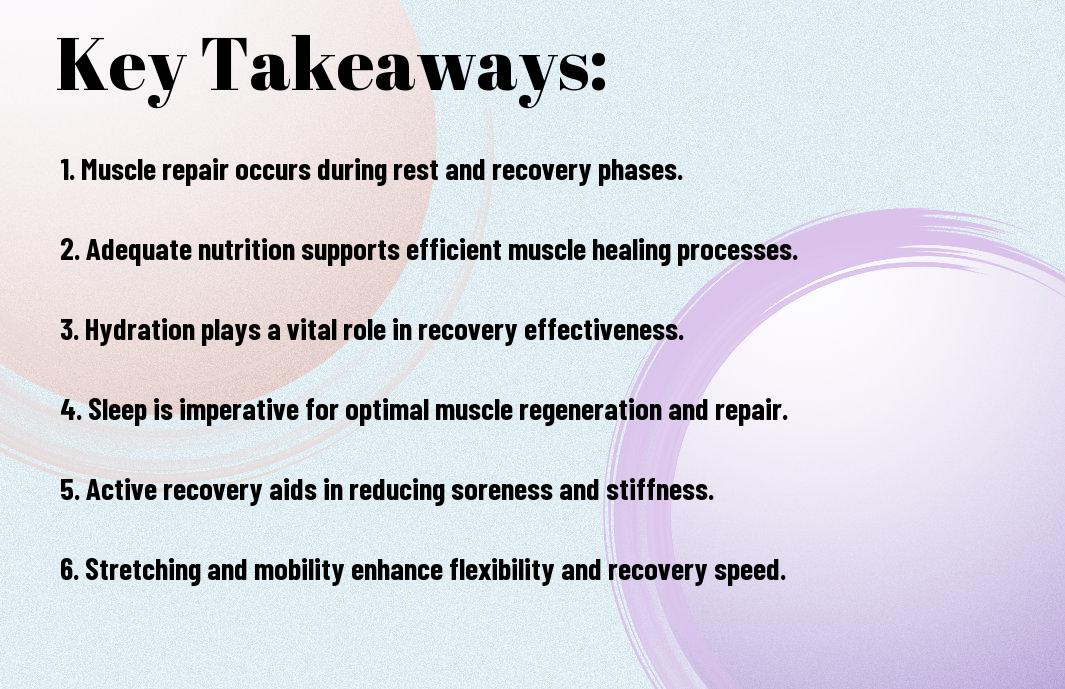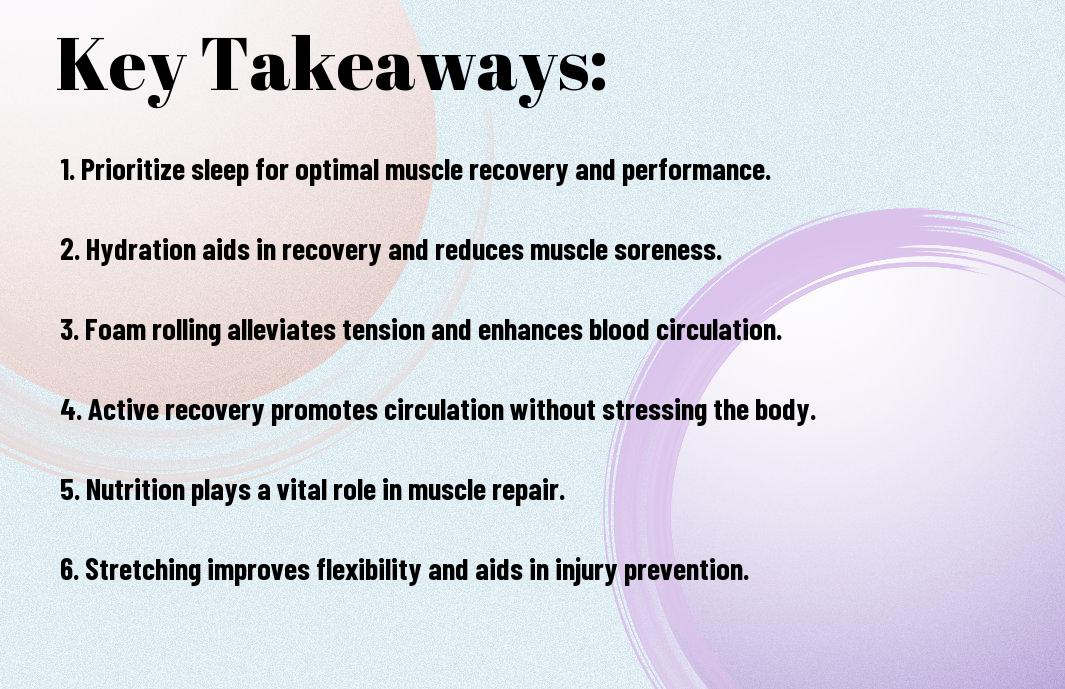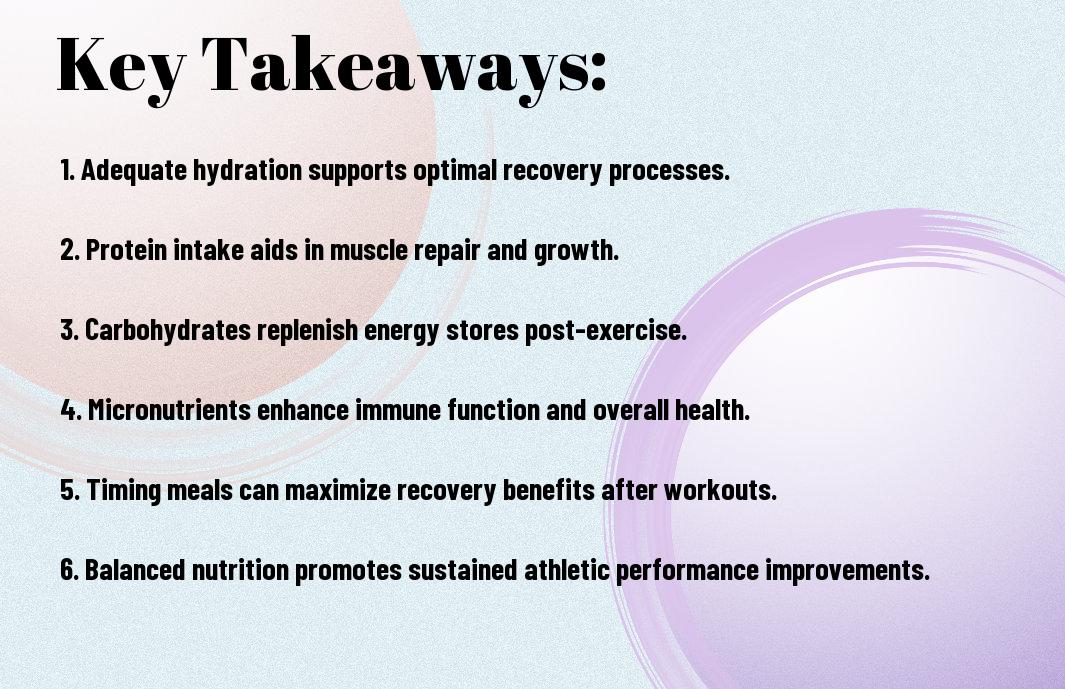With the intensity of sports activities, it’s crucial for you to prioritize recovery to optimize your performance and prevent injuries. Engaging in proper recovery techniques allows your body to repair itself, reduce muscle soreness, and enhance overall athletic performance. By incorporating methods such as hydration, nutrition, and adequate rest into your routine, you can ensure that your body is well-equipped to tackle the demands of your sport. Understanding and committing to effective recovery strategies not only supports your physical health but also contributes to your mental resilience and long-term athletic success.
Key Takeaways:
- Muscle Repair: Proper recovery aids in the healing of muscle fibers that are damaged during sports activities.
- Injury Prevention: Allowing time for recovery reduces the risk of overuse injuries that can occur from continuous strain.
- Performance Enhancement: Recovery helps improve overall performance by enabling athletes to train harder and more effectively on subsequent days.
- Hydration and Nutrition: Replenishing fluids and nutrients is vital for restoring energy levels and promoting recovery.
- Mental Recovery: Taking time to recover also supports mental well-being, reducing fatigue and enhancing focus during training and competition.
Understanding Recovery
After engaging in sports activities, it’s vital for you to prioritize recovery to enhance your performance and prevent injuries. Recovery involves the process your body undergoes to repair and restore itself from the physical strains of exercise. Proper recovery strategies allow your muscles and tissues to recuperate, ultimately leading to better overall fitness.
Definition of Recovery
Understanding recovery means recognizing it as a multi-faceted process aimed at restoring your physical and mental state after exertion. This process not only aids in muscle repair but also enhances your body’s resilience, ensuring that you’re ready for future challenges.
Types of Recovery
Across various sports disciplines, recovery can be categorized into several types, each serving a specific purpose in your athletic regimen. These types can include:
- Active Recovery
- Passive Recovery
- Restorative Recovery
- Nutrition-Based Recovery
- Mental Recovery
The integration of these recovery types into your routine can significantly impact your overall athletic performance.
| Active Recovery | Involves low-intensity exercise to maintain blood flow. |
| Passive Recovery | Consists of complete rest for your muscles to rebuild. |
| Restorative Recovery | Focuses on practices like foam rolling or massage for muscle tension relief. |
| Nutrition-Based Recovery | Involves consuming appropriate nutrients post-exercise for muscle repair. |
| Mental Recovery | Involves techniques like meditation to enhance focus and reduce stress. |
And engaging in different types of recovery methods can lead to improved outcomes in your athletic performance. You can optimize your recovery strategy by considering the following key aspects:
- Hydration
- Sleep quality
- Nutritional balance
- Stretching routines
- Mindfulness practices
The combination of these methods can greatly support your body’s recovery processes, helping you to achieve your athletic goals more effectively.
| Hydration | Maintain fluid balance to aid in recovery. |
| Sleep Quality | Ensure adequate rest for muscle repair and recovery. |
| Nutritional Balance | Consume a well-rounded diet to support energy needs. |
| Stretching Routines | Incorporate flexibility exercises to prevent stiffness. |
| Mindfulness Practices | Incorporate meditation or relaxation techniques. |
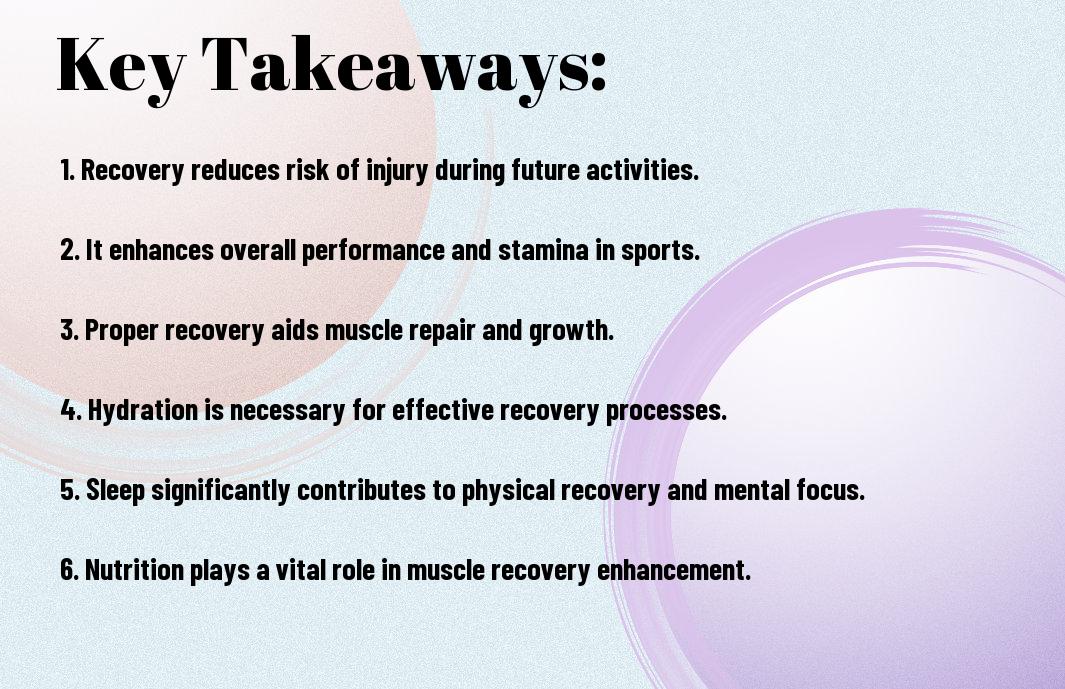
Physiological Benefits of Recovery
It is crucial to allow your body adequate recovery time after sports activities to promote optimal physiological benefits. Recovery enhances various bodily functions, helping to prevent injuries and boost overall performance. By prioritizing recovery, you aid in the restoration of your physical and mental state, ensuring you can train harder and more effectively.
Muscle Repair and Growth
Repair of muscle tissues is a significant aspect of recovery, as exercise often leads to microtears in your muscles. By allowing your body to rest, you enable these tissues to heal and grow stronger, leading to improved performance in future workouts. Adequate recovery time helps you capitalize on your training efforts and enhances your overall athletic capability.
Replenishing Energy Stores
About replenishing your energy stores, it’s vital to restore glycogen levels after intense exercise. Your muscles rely on glycogen as a primary energy source, and depleting these stores during activities can hinder performance in subsequent workouts. Thus, incorporating proper recovery strategies—such as nutrition, hydration, and rest—ensures that your body efficiently replenishes this energy, keeping you fueled and ready for the challenges ahead.
Benefits of replenishing energy stores extend beyond mere physical performance. When you effectively restore glycogen levels after activity, you minimize fatigue and improve recovery times. This enables you to maintain a consistent training schedule, preventing burnout and promoting long-term improvements in strength and endurance. Ensuring that you focus on recovery will help you remain at your best, both during practice and competitions.
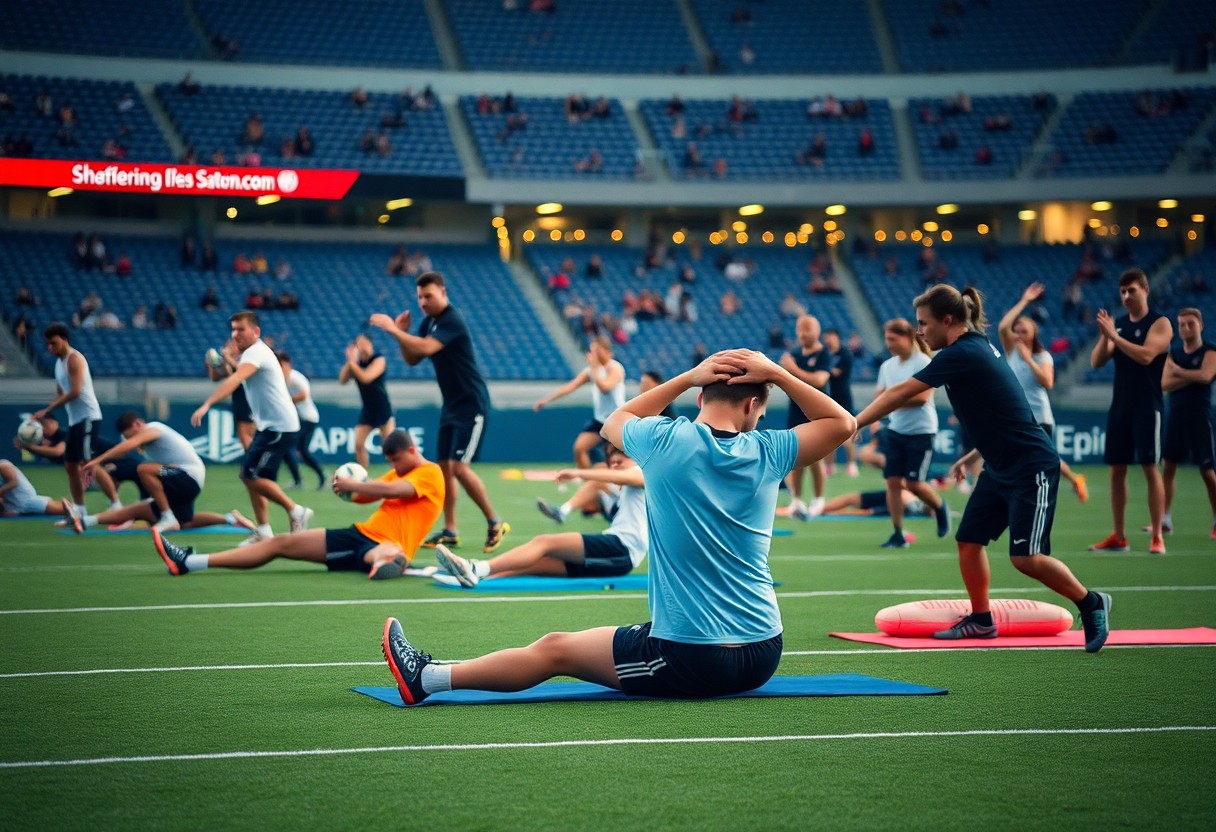
Psychological Aspects of Recovery
Many athletes overlook the psychological aspects of recovery, yet they are fundamental to enhancing overall performance. A well-rounded recovery process includes not only physical rest but also mental relaxation and rejuvenation. By prioritizing these aspects, you can help maintain focus, motivation, and positivity, which are vital for your future training sessions and competitions.
Mental Health Benefits
Against the backdrop of rigorous training and competition, prioritizing recovery can significantly enhance your mental well-being. Incorporating strategies such as mindfulness, meditation, or relaxation techniques can help maintain a balanced mindset, increasing your resilience against the pressures of performance.
Reducing Stress and Anxiety
Below the surface of physical fatigue, you may experience heightened stress and anxiety levels, which can impact your focus and overall performance. Understanding the importance of adequate recovery allows you to manage these feelings more effectively, ensuring that you approach your future activities with a clear and positive mindset.
Mental strategies for reducing stress and anxiety can be remarkably effective. Engaging in light activities like yoga or gentle stretching during your recovery can help lower your heart rate and promote relaxation. Additionally, setting aside time for hobbies or socializing can help you unwind and cultivate a supportive environment. Prioritizing these mental health benefits not only enriches your recovery experience but also promotes a healthier balance overall.
Techniques for Effective Recovery
All athletes should prioritize recovery techniques that enhance performance and reduce injury risk. Incorporating practices like stretching, foam rolling, and adequate hydration can optimize your recovery routine. You may also benefit from restorative practices such as yoga or deep breathing exercises. Engaging in these techniques allows your body to repair itself, helping to maintain your physical and mental well-being after sports activities.
Active Recovery Methods
For optimal recovery, consider incorporating active recovery methods into your routine. Activities like light jogging, cycling, or swimming at a low intensity can help increase blood flow to your muscles, aiding in the removal of metabolic waste and promoting faster recovery. Engaging in these gentler forms of exercise can keep you active without placing additional stress on your body.
Importance of Nutrition
Importance of nutrition cannot be overstated when it comes to effective recovery. Consuming the right balance of macro and micronutrients after your sports activities replenishes glycogen stores, repairs muscle tissues, and supports overall recovery processes.
Understanding the role that nutrition plays in recovery is key to enhancing your athletic performance. Focus on consuming protein-rich foods to facilitate muscle repair, alongside carbohydrates to restore energy levels. Additionally, incorporating fruits and vegetables will provide crucial vitamins and minerals that boost your immune system and reduce inflammation. Taking these nutritional steps helps ensure that your body can recover efficiently and prepare for future challenges.
Recovery Timing and Duration
After engaging in sports activities, the timing and duration of your recovery are key to enhancing performance and preventing injuries. Your muscles need adequate time to repair and replenish energy stores, and this process typically involves both immediate actions, like hydration and nutrition, as well as longer-term recovery strategies that span days or even weeks, depending on the intensity of your workouts.
Optimal Recovery Timeframes
Before you resume your next workout, take into account the optimal recovery timeframes for your specific sport or activity. Generally, lighter activities may require only 24 hours of recovery, while intense training could necessitate 48 to 72 hours or more. Tailoring your recovery duration according to the demands of your activity will help ensure your body is fully prepared for the next challenge.
Signs You Need More Recovery
Recovery starts with paying attention to your body’s signals. If you feel persistent fatigue, muscle soreness that lingers too long, or frequent mood swings, these are signs that you may need more recovery time. Ignoring these signals can lead to overtraining, making it necessary to listen to your body and adjust your recovery timeline accordingly.
Recovery is not just an afterthought; it’s an integral part of your training regime. Signs that you need more recovery may manifest as consistent fatigue that doesn’t fade even after rest, increased irritability, or a noticeable decline in your performance levels. Be attentive to these indicators; allowing yourself additional recovery time can enhance your overall athletic performance and minimize the risk of injury.
Recovery Myths and Misconceptions
Despite the widespread beliefs surrounding recovery, many myths and misconceptions can lead you astray. Some athletes assume that more rest equals better recovery, while others mistakenly believe that engaging in intense stretching can prevent injuries. Understanding the truths behind these misconceptions is vital to optimizing your recovery process and enhancing your overall performance.
Common Misunderstandings
Recovery often gets shrouded in confusion, especially when it comes to the duration and methods necessary for optimal results. You might believe that taking long breaks or avoiding all physical activity is best for recovery, yet this can actually hinder your progress. Incorporating active recovery techniques can significantly improve your overall results.
Evidence-Based Clarifications
Against popular belief, not all recovery strategies are created equal. Some practices, such as sleep quality and proper nutrition, play a more significant role than merely resting. Incorporating evidence-based practices ensures that you are making informed choices for your recovery journey.
Considering the importance of scientific research, it’s important to place your trust in methods backed by evidence. Studies have shown that active recovery—such as light aerobic exercises—can enhance your blood circulation, speed up muscle repair and reduce soreness. Additionally, prioritizing sleep hygiene and a balanced diet with adequate hydration supports your overall recovery more effectively than simply avoiding exercise. By adjusting your approach according to these evidence-based clarifications, you can achieve better results in your post-activity recovery efforts.
Final Words
To wrap up, understanding the importance of recovery after sports activities allows you to enhance your performance and avoid injuries. Incorporating effective recovery strategies, such as proper hydration, stretching, and rest, can significantly improve your overall athletic experience. By prioritizing recovery, you support your body’s natural healing processes and prepare yourself for future challenges. Embrace these practices to not only increase your endurance but also maintain your long-term health and well-being in sports.
Q: Why is recovery important after sports activities?
A: Recovery is crucial after sports activities as it allows the body to repair muscle tissues that have been strained during exercise. After intense physical activity, muscle fibers experience micro-tears, and adequate recovery enables these fibers to rebuild stronger. Additionally, recovery helps to replenish energy stores in muscles, reducing fatigue, and preventing injuries. Ensuring proper recovery contributes to improved performance in future workouts and competitions.
Q: What are some effective recovery strategies after exercise?
A: There are several effective recovery strategies that athletes can implement after exercise. Hydration is fundamental; replenishing lost fluids helps maintain optimal body function. Nutrition also plays a significant role; consuming a balanced meal rich in proteins and carbohydrates can facilitate muscle repair and glycogen restoration. Gentle stretching, foam rolling, and low-intensity activities like walking or swimming can enhance blood circulation and aid in the recovery process. Additionally, ensuring adequate sleep is key, as it allows the body to undergo necessary repair and regeneration.
Q: How does the recovery process impact long-term athletic performance?
A: The recovery process significantly impacts long-term athletic performance by allowing the body to adapt to the physical stresses of training. When athletes prioritize recovery, it helps in building endurance, strength, and overall performance as the body becomes more resilient to training demands. Over time, a consistent focus on recovery prevents overtraining syndrome, which can lead to fatigue, decreased performance, and injuries. By incorporating recovery practices, athletes can enhance their overall fitness, leading to sustained improvements and longevity in their sports careers.
